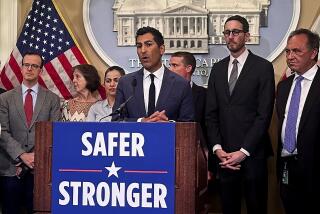Senate OKs Consumer Privacy Bill
SACRAMENTO â Without debate, the Senate on Thursday approved a potentially far-reaching bill that would require businesses to tell customers that they have released information about them to marketers in the past or plan to in the future.
Upon a customerâs demand, businesses would have to identify the actual or likely sources of the released information during the past year, provide copies of the documents and reveal who received them and when. Plans to release such information would also be subject to disclosure.
The bill, SB 27, by Sen. Liz Figueroa (D-Fremont) was sent to the Assembly on a 26-13 vote. She had scarcely presented the bill when President Pro Tem John Burton (D-San Francisco) ordered it put to a vote without questions or debate.
It was sponsored by the California Public Interest Research Group, a consumer advocacy organization, and opposed by insurance companies, banks and direct marketers.
Figueroa said consumer advocates say that if the proposal becomes law, it will be the toughest of its kind in the country. It would apply to third-party businesses and not to affiliates, subsidiaries or other members of a companyâs family of businesses.
Opponents have argued that they already operate under adequate privacy protection restrictions and are bracing for expected additional restraints this session. They said the bill would burden them with new regulatory costs and expose them to private lawsuits for damages, civil penalties and attorney fees.
California consumers complain that they are overwhelmed by unwanted advertising solicitations, but are unaware that the sales pitches probably are the result of business relationships they already have with other companies, Figueroa said.
Figueroa has said consumers not only are âpowerless to stop such invasions of privacy, they do not even know whether and to what extent it is taking place,â in part, because of increasingly sophisticated technology.
Backers of the legislation, one of many consumer privacy bills working their way through the Legislature, argue that for customers to make informed decisions on which companies to do business with, they should know how those businesses shield or disclose personal information.
In other action Thursday, the Senate approved the following bills and sent them to the Assembly:
* Soda pop -- Would prohibit the sale of soda pop at elementary schools effective Jan. 1, at middle and junior high schools Sept. 1, 2005, and at high schools Jan. 1, 2006. Currently, removal of sodas from campuses is contingent upon the state making up the loss of revenue from soft drink sales. The bill, SB 677, by Sen. Deborah Ortiz (D-Sacramento) would ban them on certain deadlines regardless of the availability of replacement revenue. The vote was 22 to 15.
* Lawsuits -- Would authorize individual workers to sue their employers for civil penalties for violations of labor laws. The bill, SB 796, also would allow them to recover their costs and attorney fees. Introduced by Sen. Joe Dunn (D-Santa Ana), the bill was approved 21 to 13, the bare majority necessary.
The Assembly passed these bills and sent them to the Senate:
* Movers -- Would give consumers added protection from unscrupulous moving companies by prohibiting haulers from failing to deliver household goods unless permitted to do so by a written contract. âThis is a major step in protecting consumers from dishonest movers who deceive customers with low estimates and then hold their belongings hostage on trucks until a ransom is paid,â said Los Angeles City Atty. Rocky Delgadillo, who sponsored the bill, AB 845, by Assemblyman Juan Vargas (D-San Diego). Violators would be subject to three months in jail or a maximum $1,000 fine.
* Shelter -- Would stiffen the penalties for companies that use illegal financial arrangements to avoid paying state and federal taxes. The bill, AB 1601, by Assemblyman Dario Frommer (D-Los Feliz) would boost the penalty for promoting an illegal tax shelter from 25% of the total amount invested by all investors to 50%. It also would set the penalty for failing to register a tax shelter with the state Franchise Tax Board at 25% of the aggregate investment.
The bill would produce an estimated savings of $5 million to $10 million a year, backers say. It was passed 43 to 28.
*
Times staff writer Nancy Vogel contributed to this report.
More to Read
Inside the business of entertainment
The Wide Shot brings you news, analysis and insights on everything from streaming wars to production â and what it all means for the future.
You may occasionally receive promotional content from the Los Angeles Times.










